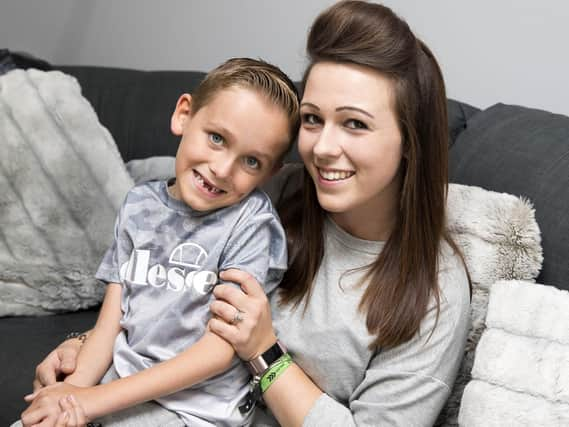Northampton mum's plea to NHS to fund rare drug to change son's life


Six-year-old Archie Kambanis of Duston has a rare muscle-wasting condition called Spinal Muscular Atrophy (SMA) and was diagnosed with SMA when he was just two.
His mum Kay, who is one in 40 people who holds the gene, was told his muscles would eventually shrink and die, but his brain would remain unaffected.
Advertisement
Hide AdAdvertisement
Hide AdDespite receiving the heartbreaking news she added that his spirit has never been broken.


Describing her son Kay said: “He’s such a character. He’s so funny. You think how can he be so bright and cheerful, nothing phases him.
“He’s a great person. The brain is not affected by the disease and he attends mainstream school.
“He is very clever, he never moans but day by day things are getting taken away from him and he has lost the ability to crawl.”
Advertisement
Hide AdAdvertisement
Hide AdSMA is a life-shortening condition where the motor nerve cells in the spinal chord become diseased, which causes a decline in physical strength. As a result, walking and eating become difficult and a simple chest infection could be fatal.
Although there is medication abroad available to treat Archie’s disease, overseas one injection of the drug Spinraza would cost Kay about £75,000 every four months for the rest of his life.
She said knowing this drug exists at an extortionate cost is unfair.
“I’d rather there was not a drug,” Kay said. “They are dangling it at us.”
Advertisement
Hide AdAdvertisement
Hide Ad“Why make it so expensive? It’s like torture for the family.
“If we were living in another European country we would get it for free.
“It just seems so unfair. We need to make sure we as a community are heard and we will not give up.”
At the moment Archie uses a wheelchair to get around and attends physiotherapy sessions, which cost £70 once a fortnight. He also has hydrotherapy sessions once a week, with a £85 price tag.
Advertisement
Hide AdAdvertisement
Hide AdThe youngster has undergone hamstring lengthening surgery to enable him to continue using specialist equipment to stand and has scoliosis, a dislocated hip and tilted pelvis.
Due to the disease progressing Archie cannot walk, stand, crawl or get from a lying to sitting position on his own.
Kay hopes one day Archie, who has type 2 SMA, can access this medication, not yet available on the NHS, for free.
Kay added: “Without Spinraza Archie will lose more strength and chest infections continue to be life-threatening. His scoliosis will worsen and he will suffer increasing pain caused by muscle tightening and dislocated hips.
Advertisement
Hide AdAdvertisement
Hide Ad“If he could access the drug he could keep the strength he has and it is highly likely he would gain many more skills. His respiratory system would no longer be at such risk and ultimately he would live longer.
“This is our fight to give Archie and many other brave children a chance at life.”
Spinraza, founded under pharmaceutical company Biogen, is administered directly into the central nervous system three times a year using an intrathecal injection.
In August this year, the National Institute for Health and Care Excellence (NICE) committee concluded that it could not recommend the drug as it “would not be a cost-effective use of NHS resources.”
Advertisement
Hide AdAdvertisement
Hide AdOn August 14 the committee published draft guidance, which did not recommend Spinraza for treating a rare genetic disorder; spinal muscular atrophy (SMA).
In August Meindert Boysen, director of the centre for health technology evaluation at NICE, said: “The committee accepted that SMA is both rare and a very serious condition that can have a severe impact on people with it, as well as on family members and carers, and that there is an unmet need for effective treatments.
“The committee was willing to be flexible because of the nature of the condition and the paucity of the evidence, but the very high cost of nusinersen [marketed as Spinraza] meant it could not recommend the drug as a cost-effective use of NHS resources.
“Nusinersen is a promising treatment that has been shown to improve a range of outcomes important to patients. We are actively engaging with Biogen to discuss how they might address the uncertainties identified by the committee while demonstrating the potential for nusinersen to be considered cost effective and managing the risk to the NHS of allowing access to this treatment.”
Advertisement
Hide AdAdvertisement
Hide AdA spokeswoman for Biogen said: "Spinraza (nusinersen) is currently being evaluated by the National Institute for Health and Care Excellence (NICE) and Biogen is in discussion with NHS England regarding a ‘Managed Access Agreement’ for early and late onset SMA.
"Until this process is complete, nusinersen is not available in England Wales and Northern Ireland via the NHS. Due to the urgent need, Biogen opened one of the largest global expanded access programmes in Autumn 2016, providing the medicine free-of-charge as a temporary solution for those with type 1 SMA (infantile onset). To date, we are proud to have provided nusinersen to over 80 eligible patients in the UK.
"The European list price of Spinraza is in line with the cost of other rare disease therapies. List prices can often be misleading as many health systems will seek to negotiate purchasing/ managed access arrangements appropriate to their local circumstances.
"The offer Biogen has made to NICE and NHS England is comparable with those agreed across Europe, where 20 countries are already provided access to patients including Scotland (and many more across the world). We are committed to continuing to engage with NICE and NHSE to discuss solutions in making this medicine available to SMA patients in desperate need of a treatment for their disease."To follow Archie's fight visit: www.facebook.com/xarchiesarmyagainstsma/